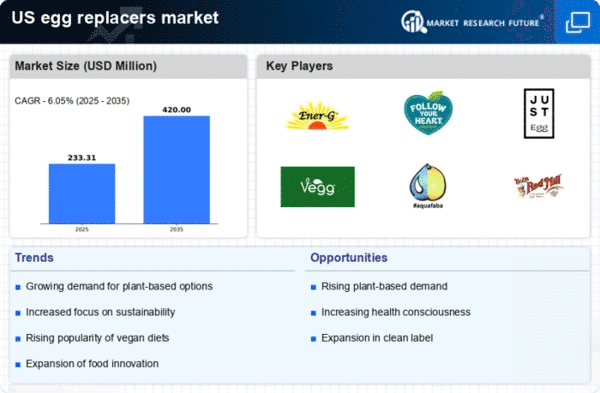Health Conscious Consumer Behavior
The egg replacers market is experiencing a notable shift driven by the increasing health consciousness among consumers. As individuals become more aware of the nutritional implications of their food choices, there is a growing preference for alternatives that align with healthier lifestyles. This trend is particularly evident in the rising demand for plant-based products, which are perceived as lower in cholesterol and saturated fats compared to traditional eggs. According to recent data, the market for egg replacers is projected to grow at a CAGR of approximately 7.5% over the next five years, reflecting the changing dietary preferences of consumers. This shift is likely to encourage manufacturers to innovate and expand their product lines, thereby enhancing the overall growth of the egg replacers market.
Rising Vegan and Vegetarian Populations
The egg replacers market is significantly impacted by the rising populations of vegans and vegetarians in the United States. As more individuals adopt plant-based diets for ethical, health, or environmental reasons, the demand for egg alternatives is expected to surge. Recent surveys indicate that approximately 6% of the U.S. population identifies as vegan, a figure that has doubled over the past decade. This demographic shift is likely to drive innovation in the egg replacers market, as companies strive to meet the diverse needs of these consumers. Furthermore, the increasing availability of egg replacers in grocery stores and restaurants is making it easier for consumers to choose plant-based options, thereby further fueling market growth.
Sustainability and Environmental Concerns
Sustainability is becoming a pivotal driver in the egg replacers market, as consumers increasingly prioritize environmentally friendly products. The production of traditional eggs is associated with significant environmental impacts, including greenhouse gas emissions and land use. In contrast, egg replacers, particularly those derived from plant sources, are often viewed as more sustainable options. This perception is supported by studies indicating that plant-based diets can reduce an individual's carbon footprint by up to 50%. As awareness of climate change and environmental degradation grows, consumers are likely to gravitate towards egg replacers that align with their values, thus propelling the market forward. The egg replacers market is expected to benefit from this trend, as brands that emphasize sustainability may capture a larger share of the market.
Regulatory Support for Plant-Based Products
The egg replacers market is also influenced by regulatory frameworks that support the development and marketing of plant-based alternatives. In recent years, various government initiatives have aimed to promote healthier eating habits and reduce the consumption of animal products. For instance, the USDA has introduced guidelines that encourage the inclusion of plant-based foods in diets. Such regulatory support not only legitimizes the egg replacers market but also provides a conducive environment for innovation and investment. As a result, manufacturers are likely to increase their focus on developing new egg replacer products that meet regulatory standards, thereby expanding their market presence. This trend could lead to a projected increase in market value, potentially reaching $1 billion by 2027.
Technological Advancements in Food Processing
Technological advancements in food processing are playing a crucial role in shaping the egg replacers market. Innovations in food technology have enabled the development of high-quality egg substitutes that closely mimic the taste and texture of traditional eggs. Techniques such as emulsification and foaming have improved the functionality of egg replacers in various culinary applications, from baking to cooking. As a result, the market is witnessing a surge in product offerings that cater to both consumers and food service providers. The integration of technology in the production of egg replacers is likely to enhance product quality and consumer acceptance, thereby contributing to the overall growth of the egg replacers market.

















